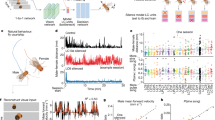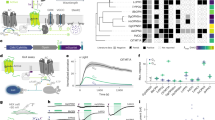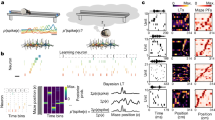Abstract
THE cockroach normally holds a chemically stimulated antenna with the opposite fore-leg during the process of cleaning. Immediately after the amputation of both forelegs the insect is unable to hold its antennae with one of the middle legs. This, however, the cockroach can do about one week after operation.
This is a preview of subscription content, access via your institution
Access options
Subscribe to this journal
Receive 51 print issues and online access
$199.00 per year
only $3.90 per issue
Buy this article
- Purchase on Springer Link
- Instant access to full article PDF
Prices may be subject to local taxes which are calculated during checkout
Similar content being viewed by others
References
Luco, J. V., and Aranda, L. C., Nature, 201, 1330 (1964).
Luco, J. V., and Aranda, L. C., Acta Physiol. Lat.-Amer., 14, 274 (1964).
Luco, J. V., Univ. Cal. Los Angeles Forum Med. Sci. RNA and Brain Function (in the press).
Aranda, L. C., and Luco, J. V. (unpublished results).
Author information
Authors and Affiliations
Rights and permissions
About this article
Cite this article
LUCO, J., ARANDA, L. Reversibility of an Electrical Correlate to the Process of Learning. Nature 209, 205–206 (1966). https://doi.org/10.1038/209205a0
Issue Date:
DOI: https://doi.org/10.1038/209205a0
Comments
By submitting a comment you agree to abide by our Terms and Community Guidelines. If you find something abusive or that does not comply with our terms or guidelines please flag it as inappropriate.



